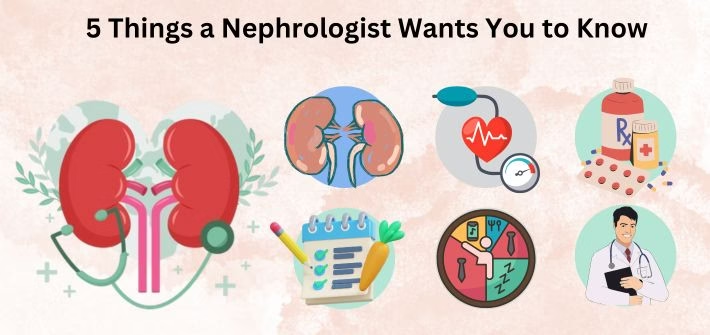Each and every organ, fluid, hormone and part of your body is important because each plays a vital and irreplaceable role of their own and no other part is capable of performing the function of one. The same way, the two tiny beans looking organs in our body called kidneys are crucial for our body. However, the importance and priority needs of this organ often gets neglected and put behind the many other organs. Kidneys do so much more than just filter waste, they regulate blood pressure, balance fluids, produce hormones, and even control red blood cell production. The most important fact to note here is that many of the functions and state of other important organs in the body depend on the kidneys’ health and proper functioning. If the kidney stops working, the working of other organs like heart, liver, glands, etc., all will stop soon.
That is why, we are here today to highlight some of the important facts and care tips regarding kidneys that a nephrologist often shares with his/ her patients to achieve a better kidney and overall health and live a good quality of life.
Things a Nephrologist Wants You to know for a Better Kidney health and Quality of Life
Kidney Disease is Often Silent—Until It’s Serious
One of the biggest challenges with kidney disease is that it’s often asymptomatic in the early stages. That means many people don’t even realize there’s a problem until the damage is already significant.
Your kidneys have a remarkable ability to compensate, so you might not notice any symptoms until 80–90% of kidney function is lost.
High Blood Pressure and Diabetes Are the Top Causes of Kidney Damage
If we have to put one line or advice every nephrologist repeats no matter the country, place or patient is that: Control and manage your blood sugar levels and blood pressure if you want healthy kidneys.
This is because chronic high blood pressure can damage the tiny blood vessels in the kidneys, making it harder for them to filter waste. Similarly, high blood sugar levels from poorly managed diabetes can scar kidney tissue and lead to a condition called diabetic nephropathy, one of the leading causes of kidney failure worldwide.
Over-the-Counter Medications Can Harm Your Kidneys
Many of the times people take some over the counter available medications during cold, cough, fever, pain, etc. However, just because they can be purchased without a proper doctor’s prescription does not mean that they are not harmful or have side effects to the person.
Common nonsteroidal anti-inflammatory drugs (NSAIDs) like ibuprofen, naproxen, and aspirin can be hard on your kidneys—especially when taken frequently or in high doses. While they’re generally safe for short-term use in healthy individuals, long-term use or misuse can lead to acute kidney injury or worsen chronic kidney disease.
Your Diet Plays a Huge Role in Kidney Health
Your diet and nutrition intake directly impact the kidney health and functioning and a diet full of junk food, sugary food, highly processed food, refined carbs, etc, can put a strain on the kidneys.
Nephrologists often recommend a diet with limited salt intake, a balanced amount of protein as high- potent diets can overwork a person’s kidney, stay hydrated but don’t make your kidney work too much by drinking too much liquids, balance is key. Nephrologists also advise to limit phosphorus and potassium from the diet especially if you already have compromised kidney health and functioning.
Early Intervention Can Help You Avoid Dialysis
Dialysis is a life-saving treatment for people with kidney failure, but it’s not something anyone wants to need. The best way to avoid or delay dialysis is to catch kidney problems early and manage them proactively.
A nephrologist’s job isn’t just to treat kidney failure—it’s to help prevent it. This may include:
- Creating a personalized care plan
- Recommending lifestyle changes
- Prescribing medications that protect kidney function
- Monitoring for complications like anemia, bone disease, and electrolyte imbalances
Even if your kidney disease progresses, early planning allows for better treatment options—including preparing for preemptive kidney transplant, which has better outcomes than starting dialysis.
Bonus Tips from a Nephrologist Chermside
- Like any other disease or problems in the organs, the kidney also gives signs and symptoms of its compromised health condition and the need of care. If you observe swollen genitals or are frothy and are in a constant state of fatigue, then don’t rub off these signs and get your kidney tested.
- Smoking and alcohol consumption is not only bad for lungs and liver but also ultimately impacts the kidney due to it facing over pressure of cleaning the excess toxin a person is putting inside his/ her body. It also increases the risk of cardiovascular disease.
High levels of cholesterol in a person’s body worsen kidney health and even increase the risk of heart diseases. Regular health checks with a trusted Nephrologist Chermside can help monitor and manage these risks effectively.

